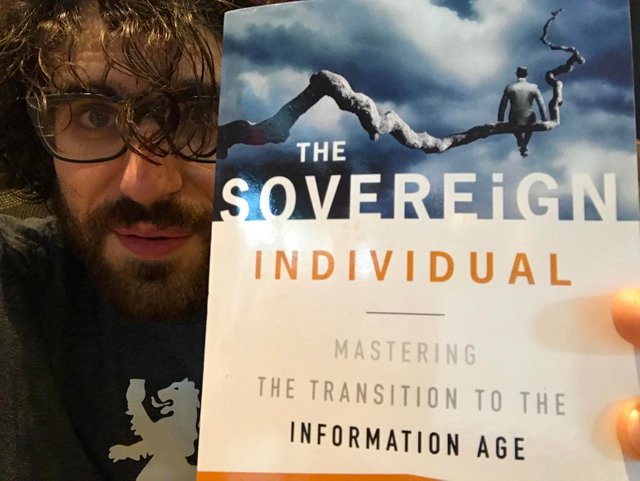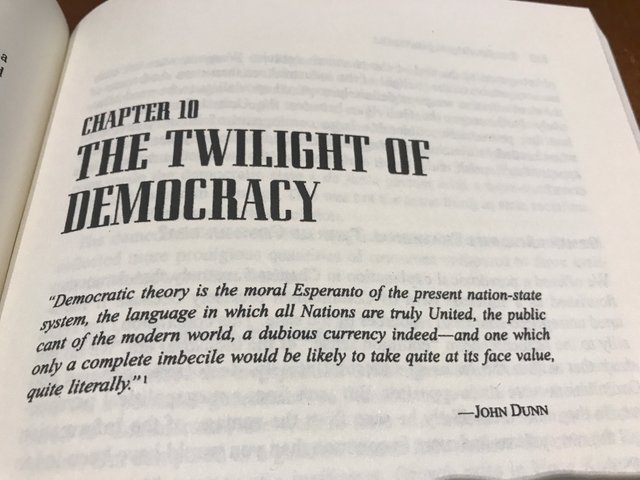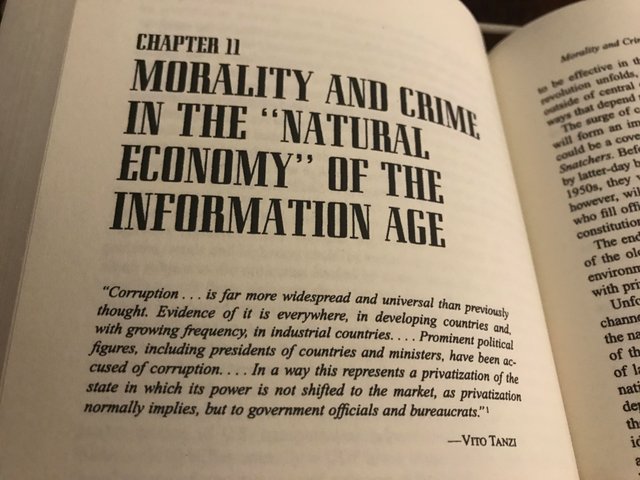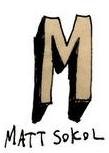Books for Better Creativity 02, Part 5: Lessons & Insights from "The Sovereign Individual” Ch. 9, 10, & 11 + Final Thoughts
The transition from industrial to information age will happen within our lifetimes. How can artists and creators thrive during this tumultuous era of history?

Introductory Thoughts for Part 5
It is ironic that the forward march of artificial intelligence may render much of STEM education useless, while leaving the artists unscathed.
Art is a reaction to culture, an emotional interpretation of data. I suspect it will be harder for robots to write beautiful music than it will for them to write useful code.
Either way, if the structure of the nation-state crumbles around us (as this book predicts) - we'll have to think on our feet to survive as individuals and as communities. In this post, we cover the last three chapters of the book.
Disclaimer:
The views represented in the book do not necessarily reflect my own.
This is a way to learn from the perspectives of others, which happens best when we challenge our own beliefs. I present this information in as politically neutral a way as I can.
In these posts, “Quotes” are direct quotes, “Notes” are notes from the book’s ideas, and “Personal Thoughts” are my own ideas.
Ch. 9 - Nationalism, Reaction, and the New Luddites

Note: The chapter starts with a summary of previous chapters: The power of information flows, through “making the world a smaller place,” will reduce the power of nation-states just like the church lost power towards beginning of the 16th century.
Quote: “[Government] finally will be subject to real market competition on the basis of how well they serve their customers… leading nation-states, with their predatory, redistributive tax regimes and heavy-handed regulation, will no longer be jurisdictions of choice.”
Quote: “The word ‘international’ was invented by Jeremy Bentham in 1789.”
Note: People are likely to become 'extranationals' in the 21st century - that is to say, they will not identify with any one nation state. This is a new alternative to living an ‘international’ lifestyle.
Note: The existence of uniform, 'national languages' can be seen as an artifact of a more centralized time - consider how many dialects can exist within one language.
Quote: “The World Wide Web creates a commercial venue with a global language, English. It will eventually be reinforced with simultaneous-translation software, making almost everyone effectively multilingual, and helping to denationalize language and imagination”
Note: Up until now, nation-states have used familial terms - the nation is the fatherland, ‘we’ are citizens, other citizens are our ‘brothers and sisters’ - this is a false appeal that encourages people to sacrifice their well-being for the state, like you might do for your real family.
Note: As more people become “extra nationals”, they will have no rational reason to pay undue taxes to bloated nation-states - and holding the majority of one’s wealth in lower tax regions will become commonplace as a matter of common sense.
Quote: “Scores of enclaves and jurisdictions more akin to city-states [will] emerge from the rubble of nations.”
Quote: “Holding a U.S. passport is destined to become a major drawback to realizing the opportunities for individual autonomy made possible by the Information Revolution… Even in the early stages of the Information Age, it has become a multimillion-dollar liability.”
Quote: “If the past is a guide, the most violent of the terrorists of the early decades of the new millennium will not be homeless paupers but displaced workers who formerly enjoyed middle-class incomes and status.”
Quote: “The relations between sovereignties [including nation-states] are always anarchic.”
Personal Thoughts: It’s interesting to consider that the relationships of the nation-states today exist within anarchy. Each nation-state has government, but the world as a whole has macro-level anarchy.
Chapter 10: The Twilight of Democracy

Quote: “Growth rates in Hong Kong were fabulous, but their superiority lay precisely in the fact that the resident of Hong Kong, not the government, was able to pocket 85 percent of the benefits of faster growth.”
Quote: [Hong Kong] is a mental model of the kind of jurisdiction that we expect to see flourish in the Information Age.”
Note: The reasons to vote in geographic constituencies (i.e. based on where you live) are going away… they were largely driven by the need to organize local militias.
Personal Thoughts: I'm not sure I agree with the above idea - based on how digital technology has played out so far, it feels like the authors of this book underestimated how important physical location would continue to be. Even if you can move more freely between geographic areas, I suspect many humans will have some "Gravitational pull" towards their old homes where they have family and friends.
Personal Thoughts: (continued from above) We will tend to pick one location as "home" and governmental structures, much smaller than today, will form around the people who call a place home.
Quote: “The dramatic phase change from mass democracy to the ultimate form of self-government, individual sovereignty, need not involve a radical shift… Such a revolution can begin, indeed, already has begun, invisibly, with the leasing of sovereign territory for use as tax-free zones.”
Quote: “Today, politicians bent on optimizing votes have little incentive to analyze problems coherently. It is hardly surprising, therefore, that their records in actually solving problems are so pathetic as compared to entrepreneurs, business executives, and coaches of sports teams, who are rewarded according to performance.”
Quote: “Consider that microtechnology miniaturizes and disaggregates. It facilitates customization… You can now go into a store and purchase blue jeans that will be from a pattern customized to your measurements and sewn up half a world away.”
Note: Why not do the same with government? If you look at the way that the business world creates effective executives/leaders, and how microtechnology enables greater choice - these two factors can combine to create a truly new and more free/representative form of government. We may not know what form it will take, but the trends seem clear.
Quote: “The commercialization of sovereignty will facilitate the control of governments by their customers.”
Chapter 11 - Morality and Crime in the “Natural Economy” of the Information Age

Note: The collapse of the nation-state will result in a short-term surge of corruption and organized crime.
Note: This problem is made worse by two trends: The trend for people to only pay attention to news that they want to hear, and the trend for most news sources to be unreliable.
Quote: “The modern technology that helps liberate information from political controls and impediments of time and place also tends to raise the value of old-fashioned judgement.”
Quote: “The Age of Information has not yet become the Age of Understanding.”
Quote: “The archetype of [bad] destructive competition is the conquerer. The archetype of [good] constructive competition is the merchant.”
Quote: "During the first half of the [21st] century there will be a massive transfer of wealth from the Old West to the New East.”
Note: The shift within nations will be for more inequality, but globally will trend towards more equality between countries.
Note: The authors argue that morality is on the decline, and that as we become more technically literate and less attached to religion / traditional values, we may see a “morally inept” society.
Quote: “The morality of the Information Age applauds efficiency, and recognizes the advantage of resources being dedicated to the highest-value uses. In other words, the morality of the Information Age will be the morality of the market.”
Quote: “The shift from an Industrial to an Information Society is bound to be breathtaking… Fasten your seat belts.”
Final Thoughts
This book has been a wild, dense ride. My view of history and of government has been blown apart, replaced by a much more dynamic and perhaps consistent idea of how human society evolved.
The authors posit that our four revolutions so far (Agricultural, Feudal, Industrial, and Information) each come along with a radical shift in the dynamics of violence. As violence's value shifts and changes, so too do the fault lines of society. I think the idea is intriguing.
I was pleasantly surprised to see that a lot of people hung out in these threads and asked questions / provided useful commentary. Huge props in particular to @everittdmickey for contributing to the comments regularly as I worked through the book.
I'll definitely keep this series going with more books. Next up is going to be a lighter read: Catching the Big Fish: Consciousness, Meditation, and Creativity (2007) by David Lynch.
What did you think of this book? What do you agree with & disagree with? Let's talk about it one last time in the comments.


These chapters have been quite thought-provoking.
It struck me that as population increases, it makes sense that our polities will need to shrink, not grow bigger - what I mean by this is at the moment (in Australia), the 'electorate' boundaries change to take into account population density, which increases at least in urban centres.
We have three levels of govt - federal, state, and local. It makes sense that a solution would be to remove one of these levels (I would argue State), but create the Local governments to be bigger and combine the duties of some state responsibilities into their existing ones.
Others could be taken over by federal.
And then if our Local governments were more aligned with 'regional' boundaries - such as Eastern, Southern, Northern etc. where there are clear natural and demographic ecologies.
We could also decentralise our major cities, and create smaller 'hubs' in these regions, which also means not everyone is trying to drive into the centre in the mornings...
Although perhaps with the Info Age, driving to work will phase out, as we can work from home, or have these hubs spread out. For that we need decent infrastructure (i.e., high-speed reliable internet).
Great work, I think I'll check this book out.
Have you ever read Douglas Rushkoff's Cyberia? Sounds like it was written around the same time (early 90's??)
😊🙏🏽☯️
Interesting idea to get rid of state government... That is one idea that goes towards the central question this book left me with, namely: "How do we transition from a world of massive government towards one of small government?"
It's a really hard question because just "ripping the bandaid off" would leave a lot of people dead - if you can't get medical insurance and nobody will treat your cancer, for one example.
But in the long run it really does seem unsustainable, especially through the lens of this book. Like you said, the info age is helping to make some things efficient by reducing commutes to work - but that might not be enough to create a major change in how our society runs.
I have not heard about Cyberia - what's the book about?
Cyberia was written around mid-90’s. Around the beginning when the internet was still not really a thing. Rushkoff covered what he saw as the beginnings of cyber-culture, and covers post-humanism, global electronic village, drugs and designing reality, technoshamanism, and memes as the weapons of cyber-conflict.
Highly recommend it, although I don’t know how well it would read over twenty years later... although it would be fascinating to see how much of Rushkoff’s predictions came true (from memory of them, most of them have).
In every first world nation...the population is decreasing.. A high standard of living is a very effective birth control.
That's interesting, because Australia's population is increasing quite a lot.
ya think?


what's the average number of children that an aussie woman has?
Interesting....... 🤔
Each nation-state has government, but the world as a whole has macro-level anarchy.
or to put it another way (which I've been wondering for decades)
why is it legal or moral for a group of people to do something that is illegal or immoral for an individual to do?
Aren't there some things that only a group can do?
If a family agrees to sell off the old family heirlooms to raise money, they can do so as a group. If dad does it by himself, against the wishes of the family - that may be immoral. Just one loose example.
yup...pretty loose.
I was referring to...say...killing.... for example.
It's been said that 'democracy is two wolves and a lamb discussing what's for dinner'.
get my meaning?
or theft.
why is it legal for a taxing authority to take my property at gun point
when it's illegal for any non government entity to do the same thing?
Starting with this: "Quote:
“The World Wide Web creates a commercial venue with a global language, English. It will eventually be reinforced with simultaneous-translation software, making almost everyone effectively multilingual, and helping to denationalize language and imagination”
to Korean, from Korean to Russian, to Arabic, to Chinese, back to English:
"The World Wide Web created a commercial website in English and became a common language that ultimately enhanced our interpreting process, helping almost everyone to translate into multiple languages, rejecting language and imagination"
W've got a ways to go with the software ;-) Glad you shared this, looks like a great read.
That's not too bad for a five language translation chain!
I think the model Hong Kong has should really be encouraged and used whenever the democracy discuss is tabled. The people having 85% is classic, can't wait for the day that happens in my country.
You know I hear a lot of talk about Hong Kong but know a woefully small amount about it. Will have to do some research....
Wonderful post. @heymattsokol